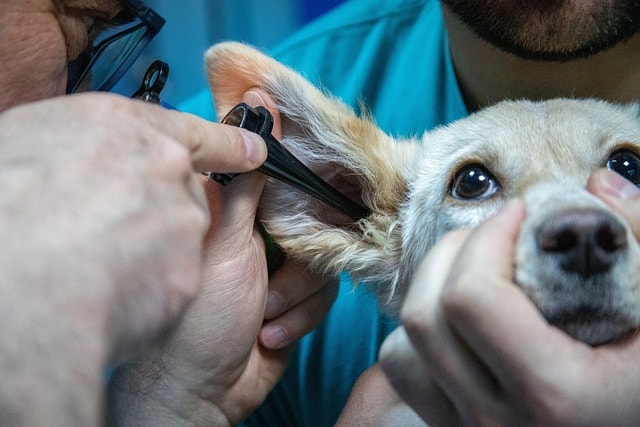Itchy ears and head shaking are common issues in dogs, often causing discomfort and irritation. As pet owners, it is crucial to understand the underlying causes and appropriate treatments to ensure the well-being of our furry companions. In this comprehensive guide, we will explore the various reasons for head shaking in dogs, along with preventive measures and treatment options.
Contents
dog head shaking and ear scratching
Does your dog shake their head often?
Common Causes :
dog ear infection
Ear infections are a primary cause of it in most dogs now. They can be caused by bacteria, bacterial or yeast infections, or fungi. Symptoms often include redness, swelling, discharge, and a foul odor.
ear infections
so that you can both get some rest! If you are able to have a look at the ear, you might find the ear is quite waxy. You can try cleaning the ear with a liquid ear cleaner designed for dogs. Cleaning the ear may help to soothe any irritation, but only if there is no redness or signs of infection. Ear infections tend to be really painful. Therefore, if your dog is shaking their head or scratching their ears, it’s best to get them checked over by a veterinarian.
Allergies
Allergies, both environmental and sometimes food allergy-related, can lead to itchy skin and ears. Common allergens include pollen, dust mites, certain foods, and even flea bites.
Ear Mites
these are tiny parasites that can infest a dog’s ears, causing intense itching and irritation. They are highly contagious and can spread easily between pets.
Foreign Bodies
Foreign bodies such plant debris such as grass seeds, dirt, or small insects can get lodged in a dog’s ear canal, leading to discomfort and itching.
Autoimmune Diseases
Certain autoimmune and inflammatory diseases can cause chronic ear inflammation and itching. These conditions often require long-term management and treatment.
Head tremors It’s important to know the difference between a head shake and a head tremor. A head shake is when your dog shakes their head on purpose, usually because of pain
Other Factors
Hormonal imbalances, tumors, or polyps in the ear canal can also contribute in dogs.
Signs and Symptoms
Recognizing the signs of ear problems in dogs is essential for early intervention. Common symptoms include:
- Persistent scratching at the ears
- Head shaking or tilting
- Redness and swelling of the ear canal
- Unpleasant odor from the ears
- Discharge or buildup of wax
- Sensitivity or pain when touching the ears
Diagnosing Ear Problems in Dogs
Veterinary Examination
A thorough veterinary examination is crucial for diagnosing ear problems. The vet will inspect the ear canal using an otoscope and may take samples for microscopic analysis.
Laboratory Tests
In some cases, laboratory tests such as cultures or blood tests may be necessary to identify the specific cause of the ear problem.
Imaging
Advanced imaging techniques like X-rays or CT scans can help detect underlying issues such as tumors or polyps.
Treatment Options
Cleaning the Ears
Regular cleaning of the ears can help prevent and treat minor ear problems. Use a vet-approved ear cleaner and follow the instructions carefully.
Medications
Depending on the cause, or other symptoms, your vet may prescribe antibiotics, antifungal medications, or anti-inflammatory drugs to treat the infection and reduce inflammation.
Allergy Management
If allergies are the underlying cause, managing the dog’s environment and diet can help reduce symptoms. Your vet may also recommend antihistamines or allergy shots.
Parasite Control
For an ear infection, mites or other parasites, your vet will prescribe appropriate medications to eliminate the infestation.
Surgery
In severe cases, surgical intervention may be necessary to remove tumors, polyps, or foreign bodies from the ear canal.
Preventive Measures
Regular Ear Checks
Regularly check your dog’s ears for signs of redness, swelling, or discharge. Early detection can prevent more severe problems.
Proper Grooming
Maintain proper grooming to prevent the buildup of dirt and debris in the ears. Trim the hair around the ears if necessary.
Diet and Nutrition
Ensure your dog is on a balanced diet to support overall health and reduce the risk of allergies.
Avoiding Irritants
Keep your dog away from known allergens and irritants, such as certain plants, chemicals, or foods.
When to See a Vet
If you notice persistent symptoms or your dog’s condition worsens despite home care, it is essential to seek veterinary attention. Early intervention can prevent complications and ensure your dog receives the appropriate treatment.
Dog head shaking and ear scratching are common behaviors that can indicate underlying health conditions or issues.This article provides a comprehensive guide to help you recognize and address these issues effectively.
Types and Categories
Common Ear Problems in Dogs
Dogs can suffer from various ear problems, including infections, allergies, and infestations by parasites. Each type of ear infection requires different approaches for proper diagnosis and accurate diagnosis and treatment.
Categorization by Cause: Infections, Allergies, Parasites
- Infections: Bacterial, fungal, and yeast infections are common in dogs and can cause significant discomfort.
- Allergies: Environmental and food allergies can lead to chronic ear problems.
- Parasites: Ear mite and other parasites can infest the ears, causing irritation and itching.
Symptoms and Signs
Observable Behaviors
Dogs with head and ear issues often shake their heads frequently and scratch their head and ears. They may also rub when shaking their head and ears against furniture or the floor.
Physical Signs in the Ear
Physical signs include redness, swelling, discharge, and an unpleasant odor from the ears. In severe cases, there may be visible sores or scabs.
Causes and Risk Factors
Biological Causes
Biological factors such as breed predispositions and genetic conditions can increase the likelihood of ear problems.
Environmental Factors
Environmental factors like exposure to allergens, moisture, and dirt can contribute to ear issues.
Lifestyle Factors
Lifestyle factors, including diet and hygiene practices, play a significant role in maintaining ear health.
Diagnosis and Tests
Initial Examination
A thorough physical examination by a veterinarian is the first step in diagnosing ear problems.
Diagnostic Tools
Tools such as otoscopes are used to inspect the ear canal and eardrum.
Laboratory Tests
Lab tests, and blood testing, including cultures and cytology, help identify the specific cause of the ear problem.
Treatment Options
Medical Treatments
Medical treatments include antibiotics, antifungal medications, and anti-inflammatory drugs.
Home Remedies
Home remedies such as cleaning the ears with vet-approved solutions can be effective for minor issues.
Lifestyle Adjustments
Adjusting the dog’s diet and environment can help prevent recurring or recurrent ear infections skin allergies and problems.
Preventive Measures
Routine Care
Regular ear cleaning and grooming can prevent many ear issues.
Dietary Considerations
Feeding your dog a balanced diet supports overall health and can reduce the risk of allergies.
Environmental Management
Managing your dog’s environment to reduce exposure to allergens and moisture can prevent ear problems.
Personal Stories or Case Studies
Real-life Cases
Sharing stories of dogs who have successfully overcome ear problems can provide valuable insights and encouragement to other pet owners.
Impact on Dogs and Owners
Discussing the emotional and practical impact on both dogs and their owners highlights the importance of addressing ear issues promptly.
dog head shaking and ear scratching Expert Insights
Veterinarian Advice
Expert advice from veterinarians on best practices for ear health.
dog shaking
to Worry If your dog has been shaking their head frequently, there are a few causes that may warrant a trip to the vet. In this post, our St. Louis vets discuss why your dog may be shaking their head so much, and when you should go to the vet. Facebook Messenger Twitter Email Share Why is your dog shaking his head so much? Dogs sometimes shake their heads. This is completely normally normal if it doesn’t happen very often. If your dog has an object or irritant in their ear they will use head shaking as a way to relieve the situation. Should you be concerned about your dog’s head shaking?
Tips from Pet Care Professionals
Tips from groomers and pet care professionals on maintaining ear hygiene.
Is your dog frequently shaking its head or scratching its ears? These behaviors are common signs that something might be amiss with your furry friend’s ear health. Understanding the causes and knowing how to address them can make a significant difference in your dog’s well-being. In this article, we will delve into the reasons behind these actions, answer frequently asked questions, and provide actionable solutions to ensure your dog’s head stays happy and healthy.
Why Do Dogs Shake Their Heads and Scratch Their Ears?
Common Causes for: dog head shaking and ear scratching
1. Ear Infections
Ear infections are one of the most common reasons dogs shake their heads and scratch their ears. This ear infection and other symptoms tend to can be caused by bacteria, yeast, or fungi and bacterial infections are often associated with symptoms such as redness, swelling, and a foul odor from the ear.
2. Allergies
Dogs can suffer from allergies just like humans. Environmental allergens such as pollen, dust mites, and even mold spores can cause ear irritation. Food allergies may also lead to chronic ear problems.
3. Foreign Objects
Sometimes, a foreign material or foreign objects like grass seeds or small twigs can get lodged in your dog’s ear, causing discomfort and irritation.
5. Moisture
Dogs that swim frequently or those with floppy ears are prone to ear infection due to moisture getting trapped in the ear canal.
Symptoms’s dog head shaking and ear scratching Watch For
- Excessive head shaking
- Persistent ear scratching
- Red or inflamed ears
- Discharge or bad odor from the outer ear ear
- Loss of balance or hearing
Frequently Asked Questions
How Can I Tell If My Dog Has an Ear Infection?
Look for signs such as redness, swelling, discharge, and a foul odor from the ears. Your dog may also shake its head and scratch its ears more than usual. If you notice these or other similar symptoms for yourself, consult your veterinarian.
What Should I Do If My Dog Has Ear Mites?
it can be treated with medication prescribed by your vet. Regular cleaning of your dog’s ears can also help prevent infestations.
Can Allergies Cause Ear Problems in Dogs?
Yes, both environmental and food allergies can cause ear problems in dogs. Identifying and eliminating the allergen is crucial for managing these issues.
How Often Should I Clean My Dog’s Ears?
The frequency of your dog’s ear flap and cleaning depends on your dog’s breed and activity level. Generally, cleaning your dog’s ears once a month is sufficient, but dogs prone to ear problems may require more frequent cleaning.
Are Certain Breeds More Prone to Ear Problems?
Yes, breeds adult dogs with floppy ears, such as Cocker Spaniels and Basset Hounds, are more prone to ear infection due to poor air circulation in the ear canal.
dog head shaking and ear scratching Prevention and Treatment
Regular Ear Cleaning
Regular ear cleaning helps prevent the buildup of wax and debris in ear drum, reducing the risk of infections. Use a vet-recommended ear cleaning solution and follow your veterinarian’s instructions.
Managing Allergies
If your dog has allergies, work with your vet to identify the allergens and develop a management plan. This may include dietary changes, medications, or environmental modifications.
Keeping Ears Dry
After bathing or swimming, make sure to dry your dog’s head shaking ears thoroughly. This helps prevent moisture from getting trapped and causing infections.
Regular veterinary check-ups are essential for early detection and treatment of ear problems. Your vet can provide professional cleaning and advice tailored to your dog’s needs.
dog head shaking and ear scratching can be signs of underlying health issues that require attention. By understanding the common causes, symptoms, and preventive measures, you can ensure your dog maintains optimal ear health. Regular ear cleaning, managing allergies, and keeping the ears dry are key strategies to prevent these problems. Always consult your veterinarian if you notice any signs of discomfort in your your dog’s ear canals, to ensure prompt and effective treatment.
Conclusion
Understanding the causes and treatments of head shaking in dogs is vital for maintaining their health and comfort. By recognizing the signs, seeking prompt veterinary care, and following preventive measures, you can help your furry friend lead a happy and itch and head shake-free life.







